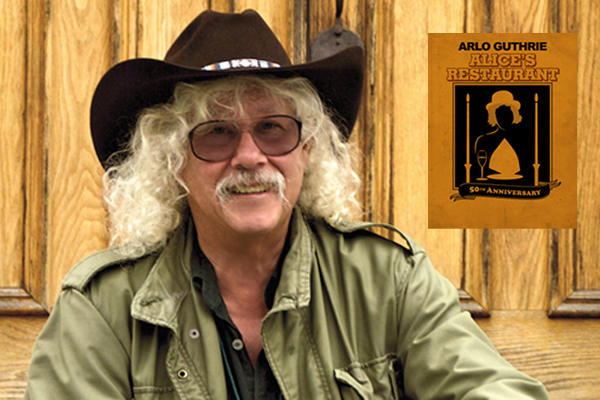Alice’s Restaurant 50th Anniversary Tour comes to the Majestic

Advertisement for Arlo Guthrie’s 50th anniversary tour performace at the Majestic. Photo courtesy of gettysburgmajestic.org
By Meghan O’Donnell, Staff Writer
On the cold and rainy night of Tuesday, September 29, Arlo Guthrie and his band performed at the Majestic Theater as part of the Alice’s Restaurant 50th Anniversary Tour. Arlo Guthrie, the son of legendary American folk singer Woody Guthrie, has become well known in his own right for the song that this tour is based on: “Alice’s Restaurant.” The song is famous not only for its length, which is nearly 20 minutes, but also for the way it discusses several social justice issues at once. Based on an actual experience of Guthrie’s as a young man, the song tackles the issues of the draft in the era of the Vietnam War, the American justice system and American policies on incarceration. The song’s release in 1967 cemented Guthrie’s place among the famous protest singers of the era and remains one of the most successful protest songs ever written.
Guthrie’s tour celebrates not only the 50th anniversary of his song but also the long tradition of folk, blues and protest music that defined the American musical consciousness from the late nineteenth century to its heyday in the 1960s (although its roots lie in the centuries-old traditions of African-American spirituals, among other origins). These musical traditions were often passed down through families and among friends. Many of the protest songs performed by Woody Guthrie, Joe Hill, Huddie “LeadBelly” Ledbetter and Muddy Waters were not even written down; they were simply shared between the musicians of the day as musical versions of oral histories. These traditions of swapping stories, sharing pain, and musical expression were at the forefront of Arlo Guthrie’s concert at the Majestic.
Sarah Lee Guthrie, Arlo Guthrie’s daughter, opened up for him in a personification of the folk tradition of passing songs and stories down through generations. Her own voice, sweet, clear and expressive, gave the folk songs she had learned from her father and his friends a bright, new sheen. And you could not forget, while listening to her, that those songs were older than all of us; Sarah Lee learned them, she said, at the feet of the old bluesmen and folk singers that were often hanging around her childhood home. She encapsulated the ancient, haunting qualities that belong peculiarly to songs that are decades old and birthed from circumstances of pain and endless searching.
It was clear, when Arlo Guthrie appeared on stage, that his daughter had inherited his knack for storytelling. He had a story for the origin of every song, whether it was a song that he had heard around campfires or a song that he wrote inspired by the first time he saw his late wife. He spoke often of memory, of people long gone and of memories that are no longer as clear as they were years ago. Some memories were sweet, some were bitter, some were painful. Every song’s tone was different, but every song was a memory.
Before performing his father’s iconic song “This Land is Your Land,” Guthrie mentioned the ways in which songs seem to come alive again when a whole crowd of people joins in to sing them. Perhaps its simply numbers, but perhaps it is something more. Perhaps, in that moment, the songs come alive because they are shared among people who are, briefly, as one. A song, after all, is just a pretty melody before there is purpose and love put into it. When Guthrie concluded his concert with “My Peace,” the magic of folk songs and the spirits of the men and women who wrote them floated along on the voices of a crowd lost in memory and in each other.
